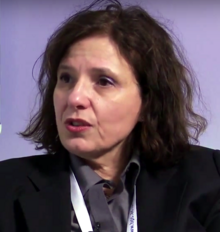Doris Taylor
Doris Anita Taylor is an American scientist working in regenerative medicine and tissue engineering. She was the Director, Regenerative Medicine Research and Director, Center for Cell and Organ Biotechnology at the Texas Heart Institute in Houston, Texas until March 2020. She is the Co-Founder of Miromatrix Medical, Inc. and Co-Founder of Organamet Bio, Inc.
Biography
[edit]Taylor was born in San Francisco and lived in Germany with her parents and two siblings, where her father was in the military. When Taylor was 6 years old, her father was diagnosed with cancer, and the family moved to Texas to seek medical treatment. Experiencing her father's death from cancer, and caring for her brother, who had schizophrenia, led her to a career in medical research.[1][2]
Taylor earned her B.S. from Mississippi University for Women in Biology and Physical Sciences and earned her PhD in Pharmacology from the University of Texas Southwestern Medical Center, Dallas, Texas.[3] She did her post-doctoral studies at Albert Einstein College of Medicine in the Bronx, New York, where she first worked with tissue engineering, growing heart muscle cells in the laboratory.[4]
She was on the faculty of Duke University from 1991 to 2007, on the faculty of the University of Minnesota from 2003 to 2012, and was with the Texas Heart Institute from 2012 to 2020. As of 2014 she retains an adjunct professor role at University of Minnesota and was an adjunct professor at Texas A&M University until 2020.[3]
Research
[edit]In 2008, Taylor's team published a paper in Nature Medicine showing that her team could create beating rat hearts using tissue engineering;[5] the work was called a "landmark". The lab first stripped the cells away from a rat heart (a process called "decellularization") and then injected rat stem cells into the decellularized rat heart.[6]
Taylor also is conducting research which has uncovered differences in the underlying framework of male and female hearts and other vital organs.[7]
References
[edit]- ^ Maggie Galehouse (January 23, 2013). "Saving lives with help from pigs and cells". Houston Chronicle.
- ^ Texas Medical Center Press Office. March 18, 2014 TMC Spotlight: Texas Heart Institute's Doris A. Taylor, Ph.D.[permanent dead link]
- ^ a b Doris A. Taylor page at THI
- ^ Krista Tippett for On Being. September 30, 2010 Doris Taylor — Stem Cells, Untold Stories Archived 2016-10-26 at the Wayback Machine
- ^ Ott, HC; et al. (February 2008). "Perfusion- decellularized: Using Nature's Platform to Engineer Bioartificial Heart". Nat Med. 14 (2): 213–21. doi:10.1038/nm1684. PMID 18193059.
- ^ Lawrence K. Altman (January 13, 2008). "Researchers Create New Rat Heart in Lab". The New York Times.
- ^ "Who has the softer heart?". 60 Minutes. May 25, 2014.

